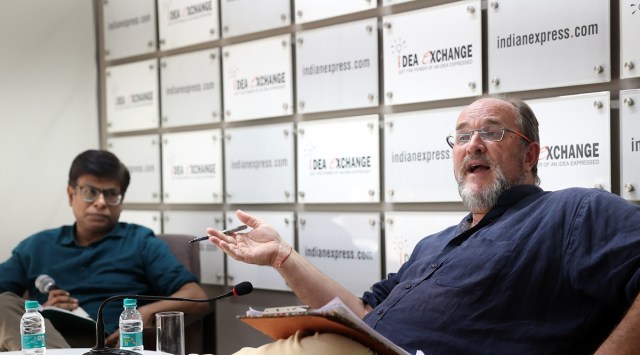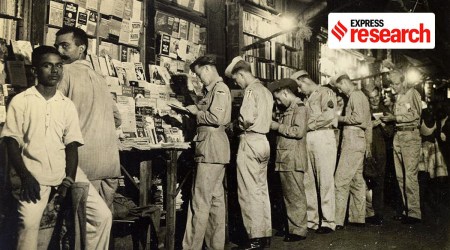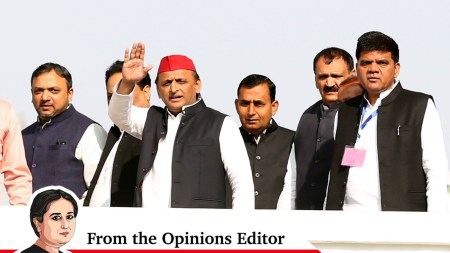Historian William Dalrymple emphasizes the importance of nuance in writing history, discusses the misconceptions surrounding Mughal tales, and explores alternative ways to approach storytelling beyond the Marxist view of history. The conversation was moderated by Associate Editor Kaushik Das Gupta.
Kaushik Das Gupta: The current landscape of historical writing is both intriguing and contentious. Could you elaborate on this?
There has been a surge in literary non-fiction both within and outside of academia, resulting in a variety of works with differing levels of quality and accuracy. Previously, the focus in this region was not on narrative or biography, with history departments leaning towards the Marxist perspective that emphasizes broader social and economic forces while downplaying individual roles. However, this trend is gradually shifting, as evidenced by the recent publication of multiple biographies of historical figures like Dara Shikoh and Akbar.
Kaushik Das Gupta: What prompted your interest in this transition?
My fascination with the 18th century, particularly the interactions between the Mughals, Marathas, Tipu’s Mysore, the post-Mughal successor states, and the East India Company, led me to delve deeper into this period. The discovery of untapped archives, such as the Mutiny Papers and other records in the National Archives, revealed a wealth of information waiting to be explored. Working closely with a linguistic expert, Bruce Wannell, we were able to uncover hundreds of untranslated Mughal biographies and narratives, shedding new light on this historical era.
Kaushik Das Gupta: What are your thoughts on the potential relocation of the National Archives?
While there are concerns about the possible relocation of the National Archives, the archives remain accessible at present. Moving archives is not an insurmountable task, as demonstrated by past relocations. While there are fears of potential pruning and increased oversight of the archive’s contents, it is essential to wait and observe how the situation unfolds.
It is imperative that historical narratives evolve with changing perspectives, but they must remain grounded in factual evidence from primary sources rather than being influenced by religious bias.
Kaushik Das Gupta: How did the English East India Company establish supremacy over other trading entities?
The East India Company emerged from the capitalist forces of Elizabethan England and operated independently for its first 150 years. Over time, it transitioned from a private enterprise to a public-private partnership, wielding significant economic and political influence. The Company’s evolution reflects broader shifts in power dynamics and economic structures, highlighting the complexities of colonialism and imperialism in historical narratives.
Kaushik Das Gupta: In what ways has the East India Company shaped British history?
The East India Company’s multifaceted role spanned various industries, from spice trading to opium and tea businesses, reflecting the changing landscape of British imperialism. The Company’s transformation from a libertarian enterprise to a state-sponsored entity underscored the complexities of colonial governance and economic exploitation. The reevaluation of the Company’s legacy during the Victorian era reflects a broader trend of historical revisionism and national identity construction in Britain.
Kaushik Das Gupta: Do you foresee a reexamination of colonial history in British education?
Despite growing debates on colonial legacies, British education largely overlooks the imperial past in favor of narratives emphasizing freedom and democracy. The historical amnesia surrounding British imperialism limits students’ understanding of global historical events and perpetuates a skewed perspective on national history. Efforts to incorporate colonial history into the curriculum face resistance from political factions, underscoring the need for a more nuanced approach to historical education.
Devyani Onial: How is colonial history taught in England?
The lack of emphasis on British imperialism in educational curricula contributes to widespread ignorance about the country’s colonial past. The selective portrayal of history as a narrative of freedom and democracy overlooks the darker aspects of imperialism, perpetuating a skewed national identity. Addressing this historical blind spot is crucial to fostering a more comprehensive understanding of Britain’s role in global events.
Kaushik Das Gupta: Has there been a push to include colonial history in British education?
The incorporation of colonial history into the curriculum has faced resistance from various political factions, reflecting broader debates over national identity and historical narratives. While there are calls for a more inclusive approach to education, the entrenched narratives of British exceptionalism and imperial glory hinder efforts to critically examine the country’s colonial past.
Devyani Onial: How did the English East India Company assert dominance over other colonial powers?
The East India Company’s rise to prominence was rooted in Elizabethan England’s capitalist expansion and its subsequent transformation into a state-sanctioned entity. By leveraging economic resources and political alliances, the Company established a vast trading network that reshaped global commerce and governance. The Company’s legacy reflects the complexities of colonial power dynamics and economic exploitation during the era of British imperialism.
Kaushik Das Gupta: How significant was the East India Company in shaping British history?
The East India Company’s influence extended far beyond economic realms, shaping political landscapes and cultural exchanges between the East and the West. Its evolution from a private enterprise to a state-sponsored entity underscored the intertwining of economic interests and imperial ambitions. The Company’s legacy in British history reflects broader shifts in global power dynamics and the lasting impact of colonialism on modern societies.




































+ There are no comments
Add yours